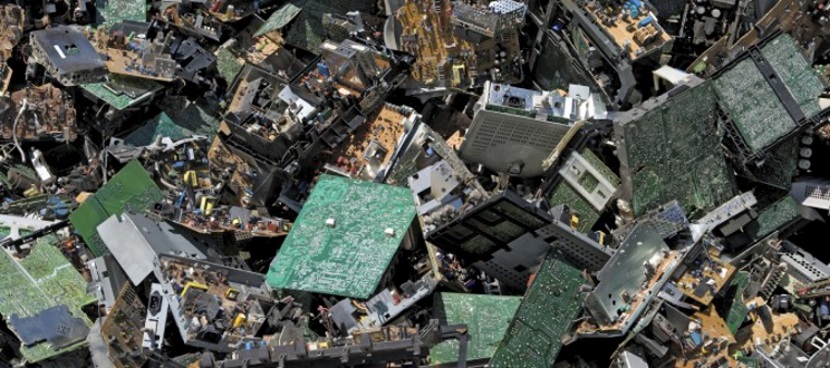Most of Europe's old tech not recycled
Report reveals Europe is "going wrong" on recycling old tech products and appliances


Europeans are chucking 750,000 tons of old tech gadgets and appliances in the bin when it could be recycled.
That's according to a report by Countering WEEE Illegal Trade (CWIT), which revealed only a third of European ewaste was recycled via the proper channels, with the rest exported overseas or merely thrown away.
Of the 65 per cent that's not properly recycled - some 6.5 million tons annually - 1.5 million tons are exported, 3.15 million tons are recycled in "non-compliant conditions", 750,000 tons are scavanged for valuable parts, and the rest are binned.
Most of the exported hardware is undocumented, suggesting it's likely illegal exports, the report noted. Much of the tech isn't recycled, but most of it is repaired and reused, as 70 per cent of it is still functioning, so the majority of it isn't - at least yet - being illegally dumped.
It's not only overseas countries scavanging old tech for useful parts or reusing repaired equipment, with millions of tons "wrongfully mismanaged or illegally traded within Europe itself," the report noted.
"The widespread scavenging of both products and components and the theft of valuable components such as circuit boards and precious metals from ewaste, means that there is a serious economic loss of materials and resources directed to compliant ewaste processors in Europe," the report added.
EU law requires member countries to track the electronics they recycle and export, but the high value of components and the high cost of recycling hazardous materials means black markets have popped around disposing of old equipment.
Get the ITPro daily newsletter
Sign up today and you will receive a free copy of our Future Focus 2025 report - the leading guidance on AI, cybersecurity and other IT challenges as per 700+ senior executives
"We don't need to look at what happens in Ghana, Nigeria and China. A lot is going wrong in Europe. The mismanaged e-waste within Europe is ten times the amount exported to places like Ghana," Pascal Leroy, secretary general of the NGO WEEE Forum, told Euractive.
One cause is the high cost of disposing of dangerous materials such as toxins like mercury and cadmium, he said, adding that European consumers were adding to the problem by tossing smaller handheld devices into the bin.
CWIT called for better awareness of the issue, an EU ban on cash transactions in scrap trade, and more effort in reporting, investigation and law enforcement on ewaste.
Freelance journalist Nicole Kobie first started writing for ITPro in 2007, with bylines in New Scientist, Wired, PC Pro and many more.
Nicole the author of a book about the history of technology, The Long History of the Future.
-
 Bigger salaries, more burnout: Is the CISO role in crisis?
Bigger salaries, more burnout: Is the CISO role in crisis?In-depth CISOs are more stressed than ever before – but why is this and what can be done?
By Kate O'Flaherty Published
-
 Cheap cyber crime kits can be bought on the dark web for less than $25
Cheap cyber crime kits can be bought on the dark web for less than $25News Research from NordVPN shows phishing kits are now widely available on the dark web and via messaging apps like Telegram, and are often selling for less than $25.
By Emma Woollacott Published
-
 UK financial services firms are scrambling to comply with DORA regulations
UK financial services firms are scrambling to comply with DORA regulationsNews Lack of prioritization and tight implementation schedules mean many aren’t compliant
By Emma Woollacott Published
-
 What the US-China chip war means for the tech industry
What the US-China chip war means for the tech industryIn-depth With China and the West at loggerheads over semiconductors, how will this conflict reshape the tech supply chain?
By James O'Malley Published
-
 Former TSB CIO fined £81,000 for botched IT migration
Former TSB CIO fined £81,000 for botched IT migrationNews It’s the first penalty imposed on an individual involved in the infamous migration project
By Ross Kelly Published
-
 Microsoft, AWS face CMA probe amid competition concerns
Microsoft, AWS face CMA probe amid competition concernsNews UK businesses could face higher fees and limited options due to hyperscaler dominance of the cloud market
By Ross Kelly Published
-
 Online Safety Bill: Why is Ofcom being thrown under the bus?
Online Safety Bill: Why is Ofcom being thrown under the bus?Opinion The UK government has handed Ofcom an impossible mission, with the thinly spread regulator being set up to fail
By Barry Collins Published
-
 Can regulation shape cryptocurrencies into useful business assets?
Can regulation shape cryptocurrencies into useful business assets?In-depth Although the likes of Bitcoin may never stabilise, legitimising the crypto market could, in turn, pave the way for more widespread blockchain adoption
By Elliot Mulley-Goodbarne Published
-
 UK gov urged to ease "tremendous" and 'unfair' costs placed on mobile network operators
UK gov urged to ease "tremendous" and 'unfair' costs placed on mobile network operatorsNews Annual licence fees, Huawei removal costs, and social media network usage were all highlighted as detrimental to telco success
By Rory Bathgate Published
-
 Labour plans overhaul of government's 'anti-innovation' approach to tech regulation
Labour plans overhaul of government's 'anti-innovation' approach to tech regulationNews Labour's shadow innovation minister blasts successive governments' "wholly inadequate" and "wrong-headed" approach to regulation
By Keumars Afifi-Sabet Published